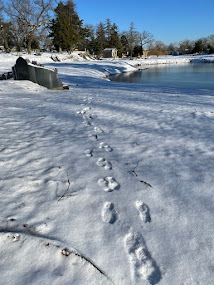 |
| Harleigh Cemetery, Camden, New Jersey |
Cemeteries are often regarded as serene spaces, where the echoes of the past reverberate through weathered tombstones and ancient trees. When winter blankets these sacred grounds with a pristine layer of snow, a unique and ethereal atmosphere emerges, providing photographers with a captivating canvas to explore.
 |
| Calvary Cemetery, Cherry Hill, New Jersey |
The snow-covered landscape transforms cemeteries into a surreal and hauntingly beautiful realm. The soft white blanket conceals the intricate details of tombstones, creating a minimalist aesthetic that accentuates the stark contrasts between life and death. Each snowflake delicately adorns the final resting places of the departed, adding a sense of purity to the somber scene.
 |
| Calvary Cemetery, Cherry Hill, New Jersey |
One cannot ignore the symbolism embedded in the juxtaposition of snow and tombstones. The cold embrace of winter mirrors the inevitable passage of time and the transience of life. Through the lens of a camera, this frozen tableau becomes a poignant reminder of the cyclical nature of existence – a visual meditation on mortality and the enduring beauty that persists even in the face of decay.
As a photographer navigates the snow-covered paths, the silence of the cemetery becomes palpable. The hushed stillness of winter magnifies the solitude and contemplative atmosphere, inviting introspection and reflection. This silence, punctuated only by the crunch of snow underfoot, fosters a sense of reverence for the sacred space and the stories it holds.
 |
| Calvary Cemetery |
 |
| Evergreen Cemetery, Camden, New Jersey |
In conclusion, photographing cemeteries in the snow is a poetic exploration of life, death, and the enduring beauty that transcends the seasons. The frozen landscape becomes a canvas for contemplation, inviting viewers to reflect on the passage of time and the interconnectedness of past, present, and future. Through the lens of a camera, cemeteries in the snow reveal a frozen elegy, where silence and solitude merge to create a visual ode to the eternal cycle of existence.
EPILOGUE:
Not bad for a Chat GPT generated article, hm? I simply typed in, “500 word essay on photographing cemeteries in the snow,” and out popped this AI masterpiece in a second! It even came up with the title, "Photographing Cemeteries in the Snow: A Frozen Elegy." I just added photographs that I took last week during and after a couple snowstorms in South Jersey. What do you think? Kind of serious and melodramatic - frozen, even, huh? Maybe I should have said, "Make it sound like Ed Snyder wrote it ..."






You got me, Ed. I was really impressed with your poetic terms and gentle phrases, and I thought I'll never be able to compose anything as grand as this, and then to find out an app spit it out! I don't know whether to laugh or cry! Sue F.
ReplyDeleteLive and learn, right?
DeleteI was thinking you had got tiresome in your writing. Glad it wasn't you
ReplyDeleteTiresome, ha! Read my latest about Falling Snow! Thank you!
DeleteIt was somewhere during the third paragraph when I thought “This doesn’t sound human.” There were a few turns of phrase that gave it away. It would probably be scored very well by a creative writing instructor.
ReplyDeleteSilliness, huh? Read my latest, if you please, about Falling Snow...
DeleteHa! Me? Never.
ReplyDelete